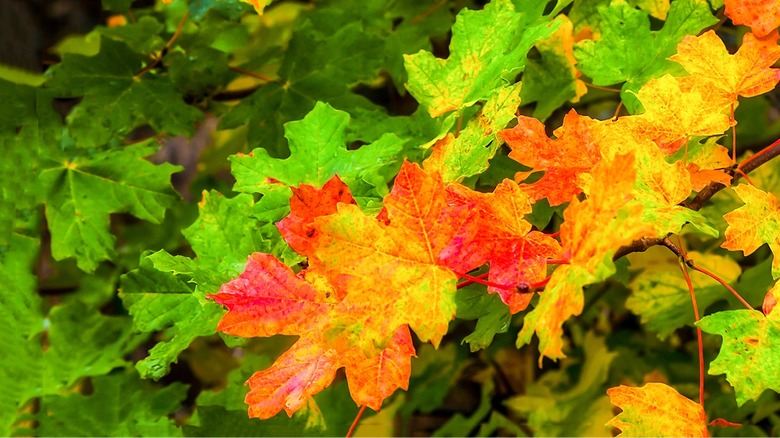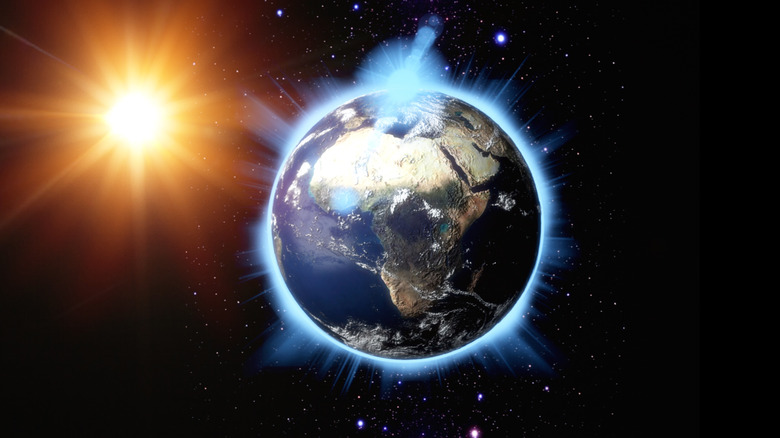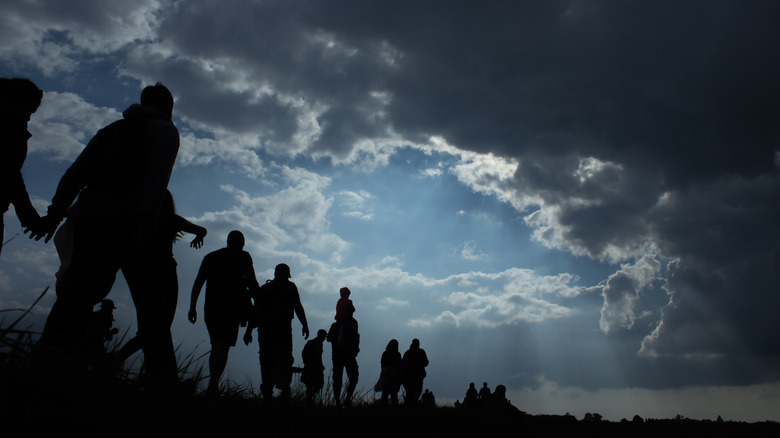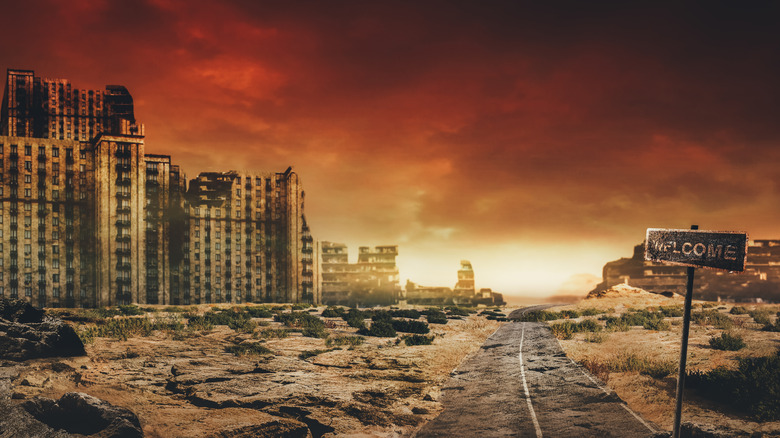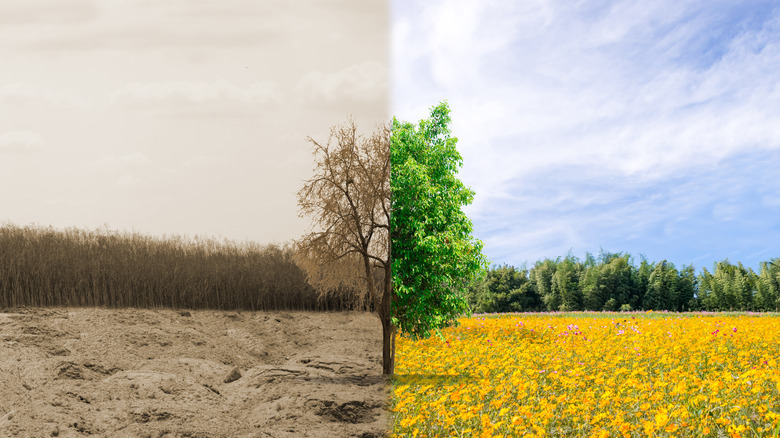What Life Would Look Like If There Were No Seasons
Changing seasons is one aspect of life that most people look forward to. As we sit upon our planet, the massive spinning magnet (via U.S. Geological Survey) circling the sun in prograde, transformations are constantly taking place. The change of season is arguably one of the most visible and alluring.
As human beings, we are sentimentally attached to the change of seasons as they inspire a sense of nostalgia (via Discover Magazine). Summer offsets the sound of rushing waves as we hold seashells against our ears or dip our feet in warm sand. We associate it with freedom from rigorous school schedules, excitement from roaring roller coasters, and that hollow sound of footsteps touching boardwalk planks in time. When summer gives way to autumn, we immediately connect to aromatic scents of cinnamon, pumpkin, and apple. We envision the boldly colored foliage that livens up the trees. Winter is as picturesque as a snow globe, flecks of white dotting the Earth, warm drinks in hand. Spring blooms around us, reviving dormant flowers, bringing new life after the winter's freeze.
Seasonal changes invoke many emotions, but on a grander scale, they have an impact on the entire planet, altering just about everything from temperature and precipitation to evaporation rates and the ways in which rivers flow (per National Oceanic and Atmospheric Administration). Losing seasons would affect not only our senses, but also our food supply, migration patterns, the way we interact with other animals, and more.
No seasons equals no tilt
According to Live Science, the prospect of no seasons could only be made possible if Earth no longer tilted on its axis. After all, this subtle tilt that varies between 22.1 and 24.5 degrees every 40,000 years or so is what causes the seasonal variations (via Earth Observatory NASA). Scientists posit that an earth without tilt would create a drastically different lifestyle for human beings, mostly because areas outside of the equator would be unbearably cold and difficult to reside in for long periods of time.
The tropics, which include the equator, are already emblematic of a seasonless planet. National Geographic reports that the area's excess exposure to the sun creates a situation where this region does not experience seasons, at least not in the sense that the rest of the world does. Rather than winter, summer, spring, and fall, the tropics have only two "seasons" to choose from. One is wet, with downpours or sprinklings of rain. The other is dry like the desert and features less than four inches of rain in total (per Climate Types for Kids).
Notedly, there are some regions along the equator that feature a completely unchanging tropical wet climate (via Climate Types for Kids). These are the regions that produce our tropical rain forests and they are the closest thing we currently have to a seasonless place on Earth.
Mass migration would be inevitable
If the only temperate weather to be found existed along the equator, it wouldn't take long before mass migration would have to occur (via Finger Lake Times). According to Cool Antarctica, there are only a handful of animals that can endure year-long arctic temperatures, because these conditions require a vast degree of internal and external insulation. So, while the penguins, polar bears, and collared lemmings might get to stay put, the vast majority of land mammals, including but certainly not limited to humans, would have to head for the equator to survive.
USA Today reports that even under current conditions, where slow migrations are becoming necessary as a result of climate change and more than half of earth's creatures are already in the process of relocating (via National Geographic), most species will not be able to move quickly enough to avoid extinction. In a scenario where seasons cease, the plight would be much worse and the migration would need to happen faster.
Rapid mass migration poses a massive share of challenges all by itself. Envision a scenario where humans race against wildebeests and dodge elephant stampedes in a race for the finish line which, in this case, is the equator. All the while, bats, birds, and monarch butterflies would be fluttering overhead, each species vying for a rightful place in the new food chain, one in which humans likely wouldn't be the top anymore.
Slow but steady collapse of civilization
We need only look to previous natural disasters to see the heavy economic toll of mass migration. As individuals flee in a state of panic, leaving treasured belongings behind, those who escape with their lives still lose bits of their humanity as they are thrust into makeshift shelters and unthinkable conditions.
In other doomsday scenarios there would be a sudden event that takes out the power lines and renders humanity back into the stone age in mere minutes. Notedly, in a seasonless world, this process would actually take longer. According to BBC, there are only two remote places left on the entire planet that do not have some variation of internet available. The interconnected Wi-Fi system is a maze of fiber optic magnificence that almost seems unbreakable — almost.
According to Gizmodo, the internet we rely upon for almost every modern amenity does need to undergo maintenance every few years so that all the computers on the planet don't just suddenly overheat and die at once. The maintenance is conducted via cooling towers which are predominantly located in industrialized nations. The United States, for instance, is home to 2 million of the aforementioned cooling towers (via NSF). If everyone up and left for good we would lose power and connectivity eventually, but it would be a slow and agonizing defeat.
Animal overpopulation and loss of plant life
Many animals instinctively breed during warmer months under the assumption that food is more abundant at that time (via Ask A Biologist). If there were no seasons, animals attempting to adapt to the cold and snow might not breed as often or even at all. Animals that hibernate during winter would wake up at the time when it's supposed to be spring due to their internal circannual rhythm. According to UCSB Science Line, this internal clock relies on chemical reactions in the brain to tell what time and season it is, not atmospheric changes, since most hibernating animals are tucked deep into tunnels, dens, and hollow trees (per Farmer's Almanac). As such, the atmospheric shift would throw off breeding and hibernating patterns, causing some animals to overpopulate and other animals to starve and eventually die off.
Because plants are firmly rooted in the ground, their migration to the equator would be a painstaking process. The poor plants would inch their way toward the equator at a speed of approximately 95 feet per decade (per CBS News). During the process, many of them would die, leaving the remaining humans malnourished due to a lack of vegetables for nutrition and herbs for medicine. Disease would likely run rampant due to overcrowded conditions, faster spread of germs, and this lack of medicine and nutrients.
Alteration of human cognitive abilities
Although human beings don't hibernate or have a particular mating season, the seasons do have an impact on much of our psychology. According to Proceedings of the National Academy of Sciences, a small study titled "Seasonality in human cognitive brain responses" concluded that the human brain's functionality actually changes with the season. It responds to similar tasks in different ways depending on whether it's summer, winter, spring, or fall.
Not only do seasons affect our mood, causing surges and drops in serotonin with light and temperature fluctuations (via Mayo Clinic), but they also affect our immune systems by altering the activity of thousands of genes within our bodies (per University of Cambridge). Even color perception changes with each passing season, making colors like yellow appear more vibrant or dull, depending on whether it's summer or fall (via Live Science).
In brief, a seasonless world is an environment humans and other animals could potentially survive, but the day-to-day experience would be drastically different from the lives we're accustomed to living, shifting our lifestyles to a point beyond recognition.
